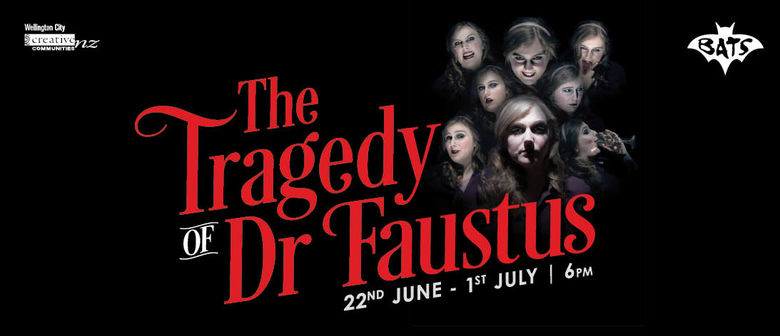by Laura Ferguson
Devon Nuku has done a brilliant job with this iteration of The Tragedy of Dr. Faustus. The 1920s setting and the gender of the protagonist are really the only large changes Nuku has made to the story, and it works all the better for it. The 1920s was a time when hedonism was in vogue with the many bright, young people and occultists such as Aleister Crowley were still going strong. A time when sciences such as psychology became mainstream and women first became bohemian, wearing trousers, pageboy haircuts and pursuing higher education. It makes utter sense, then, to make the lead character a woman and set the new socially instituted independence of her gender spiral into a freefall of doom. Having Faustus retain the arrogance and dismissive attitude to religion serves to embed the play in its traditional roots, which then blossom into a new and interesting flower.
I’m loving this brassy, self-serving she-Faustus. Katie Boyle has a fantastic way of portraying the character and filling her with life. Boyle performs as if she were a native Early Modern English speaker, every line of dialogue tripping off her tongue with ease and presence. Boyle’s delivery is enhanced even more by the way she uses modern exclamations to emphasise her reactions. The ‘Woo’s’, ‘Yay’s’ and ‘Oof’s’ are delightful and really help audience members to engage with the dialogue-heavy play. Boyle energises the show with these inclusions and I am thoroughly immersed. In this, I am not alone. The gentleman next to me started off complaining that his date had brought him to something he wouldn’t understand, but 15 minutes later he is leaning forward in his seat, chuckling at the wit and very much enjoying himself. I would say Boyle’s characterisation has a lot to do with this turnaround of opinion. Boyle is able to embody Faustus in such a way that I am entertained by her arrogance and foolish decision-making rather than frustrated by it. Her sarcastic eye rolling, flourished boasts and wry mouth twists have me giggling throughout the performance.
The partnership between Boyle as Faustus and Tom Kereama as Mephistophioles is fantastic. Kereama portrays Mephistophiles as powerful, charming, genteel, menacing and dangerous all at once. I love the way he will ingratiatingly smile at Boyle, but as she turns away we see the mask fall and hunger comes to his eyes, a ravenous want to feast on Faustus’ soul. This keeps the tension of the play taut and I find myself unable to glance away even for a moment in case Mephistophiles does something drastic and snaps Faustus’ neck.
Jett Ranchod’s special effects make-up also ensures that the devils are seen as otherwordly. The veins on Mephistophiles garnering a look of bulging tension that enhances the threat he poses to Faustus. The symbols on the devils and angel tie in to the arcane symbol on the ground which Faustus uses to summon Mephistophiles. Set designer Charlie Potter has ingeniously made this a semi-circle, the rest being hidden under the audience. This portrays the half-life Faustus will now live. Part natural, as we in the audience do, and also unnaturally, like the beings she has sold herself to. The idea to have Faustus’ books being taken away from her throughout the play was also brilliant. I love the metaphor that Faustus continually limits the choices open to her. The books being taken or given away depicting how Faustus distances herself from the mortal realms of knowledge and, therefore, sealing her fate.
I would also like to mention Hamish Boyle’s character, Robin, who was hilarious as the illiterate yard boy who tries some magic of his own. The way Boyle delivered his character with the confidence of someone who knows what they are doing, while really having no idea, was so funny and I laughed at every blustering line. Particularly the instances of when it is pointed out to him that the book he is ‘reading’ is upside down. Boyle’s scoffing defensiveness eliciting even more laughter from me.
The play ends with Faustus losing her soul to the Devil, as outlined in the show’s first moments and the contract Faustus signed. Normally, I look forward to these moments of schadenfreude when a character gets their comeuppance for their immoral decisions. This time, though, Boyle pulls at me with the frantic passion of someone truly desperate and I feel it body and soul, if my consciousness is, indeed, a soul. My stomach drops and there is a heaviness in my chest knowing that there is nothing now that will save Faustus. Arrogant Faustus. Eternally damned Faustus… Poor Faustus.
Leaving the theatre, I feel strangely clean. It’s not a feeling I have felt after a show before and I hug myself as if wanting to keep what makes me alive and individual as close to me as possible. The Tragedy of Dr. Faustus is very funny, excellently performed and absolutely a tragedy. I now have a piqued interest to see more of Christopher Marlowe’s work and to look for more shows involving director Devon Nuku and actors Katie Boyle and Tom Kereama. To convince those perhaps unwilling to go see a show in an older version of English, I would like to end using the immortal words of the gentleman next to me: “Well, that was bloody good. I think maybe I’m smart now.”
The Tragedy of Dr. Faustus runs at BATS Theatre until Saturday 1 July in the Heyday Dome. Visit the BATS website for ticketing information.






